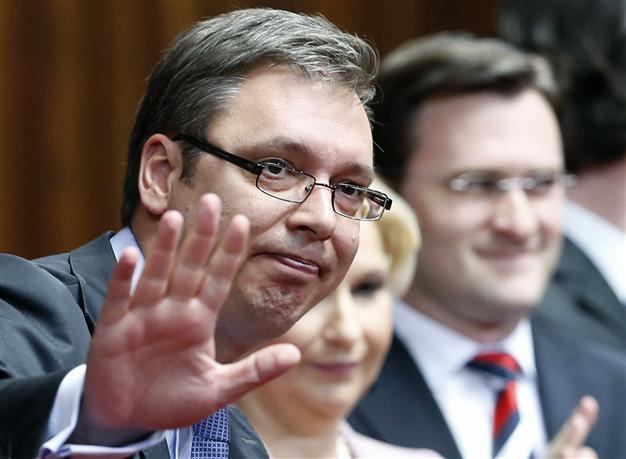New Serbia cabinet to press EU bid, tackle economic woes
BELGRADE - Agence France-Presse

Vucic announced that his government would be formed on Sunday. AP Photo
Serbia's parliament met on Sunday to vote in a new cabinet which is expected to push the country's bid to join the EU and urgently tackle the ailing economy.
Aleksandar Vucic, leader of the centre-right Serbian Progressive party (SNS), was given a mandate after a landslide victory in the March vote called after Serbia began EU membership talks in the wake of a landmark accord with breakaway Kosovo last year.
In his speech to parliament, Vucic said the priority for his 19-member cabinet would be the reform of Serbia's outdated economy, a reduction in the budget deficit and moves to accelerate Belgrade's bid to join the EU.
The parliament, in which the SNS has 158 seats in the 250-member assembly, is expected to vote in the new cabinet later Sunday.
Vucic invited his former coalition partners, the Socialists, founded by late Serbian strongman Slobodan Milosevic, to join the government.
Socialist leader and former prime minister Ivica Dacic will hold the post of foreign minister.
Lazar Krstic will remain finance minister, while former World Bank expert Dusan Vujovic will be economy minister, among several non-party ministers in the cabinet.
Vucic, 44, was once an ultra-nationalist hawk but reinvented himself as a pro-European anti-corruption campaigner.
Serbia -- the largest country to emerge from the break-up of Yugoslavia in the 1990s, with a population of 7.2 million people -- has to reform antiquated labour and other economic laws and cut down on bureaucracy.
More than 20 percent of the workforce is unemployed, and those with jobs struggle to survive on an average monthly salary of 350 euros ($480).
Serbia's budget of eight billion euros ($11 billion) is struggling to cope with 1.7 million pensioners and a bloated public sector that employs more than 700,000 people.
The new government will have to push through a stringent austerity package, including the privatisation of more than 170 state-owned companies, along with subsidy cuts and tax increases.
The government will also have to focus on further steps in normalising relations with Kosovo, a key condition for Serbia's EU membership hopes.
